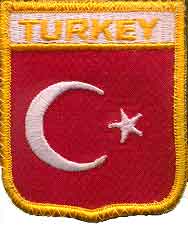|
.Turkey - 2002
The Reverend Doctor James Wiberg
The annual meeting of the AICEMEA (The Int. Conf of Churches in Europe, the
Middle East and Africa) held in Antalya, Turkey this year was the occasion for a
seminar on the "cradle of Christianity." Biblical scholar Mark Wilson,
Director of a Research Institute specializing in ancient Anatolian archaeological
sites offered participants an amazing depth of wisdom and insight regarding the
travels and ministry of the Apostle Paul and 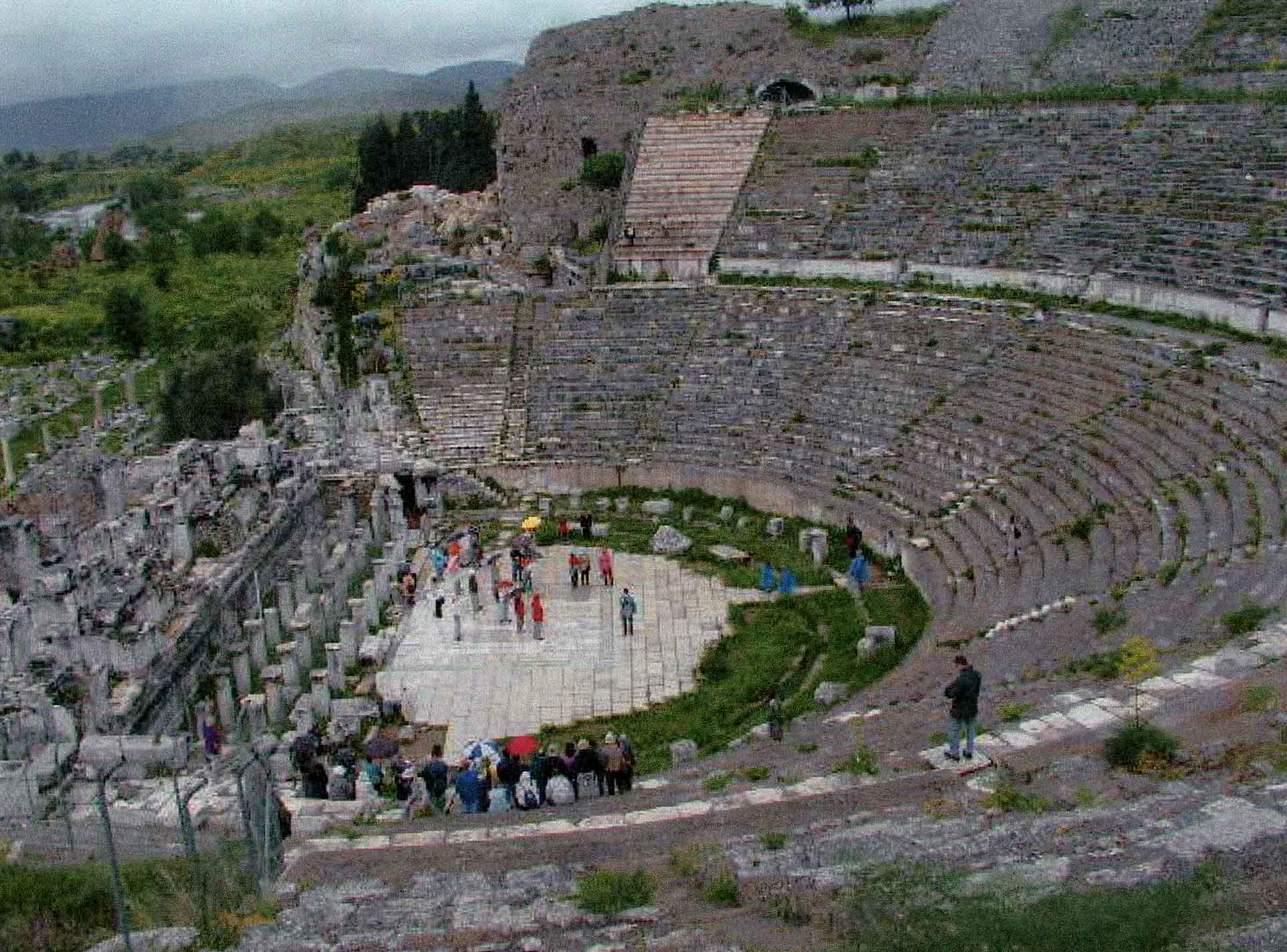 the seven churches of the Book of
Revelation. Sites that we visited in Turkey included many of the missionary
stations where the first Christian congregations were organized: Antioch of
Syria, Iconium, Lystra, Derbe, Laodicea, Hierapolis, Colossae, Smyrna and of
course, Ephesus where the Austrians particularly have been active for more than
100 years and have made this ancient Roman site a superb open air museum. Here
in Ephesus are the ruins of one of the great libraries of Rome---the Celsus
library and the great theater [see picture] seating 30,000 people where the riots broke out
following Paul's preaching and forced his departure from the city. A group of
Korean pastors and their spouses whom we met while touring the theater joined us
in singing some of our great Christian hymns from the center of the stage to
demonstrate the marvelous acoustics of these theaters. The strains of "How
Great thou Art" and "O for a Thousand Tongues to Sing My Great
Redeemer's Praise" resounded where once people clamored for Paul's
death. the seven churches of the Book of
Revelation. Sites that we visited in Turkey included many of the missionary
stations where the first Christian congregations were organized: Antioch of
Syria, Iconium, Lystra, Derbe, Laodicea, Hierapolis, Colossae, Smyrna and of
course, Ephesus where the Austrians particularly have been active for more than
100 years and have made this ancient Roman site a superb open air museum. Here
in Ephesus are the ruins of one of the great libraries of Rome---the Celsus
library and the great theater [see picture] seating 30,000 people where the riots broke out
following Paul's preaching and forced his departure from the city. A group of
Korean pastors and their spouses whom we met while touring the theater joined us
in singing some of our great Christian hymns from the center of the stage to
demonstrate the marvelous acoustics of these theaters. The strains of "How
Great thou Art" and "O for a Thousand Tongues to Sing My Great
Redeemer's Praise" resounded where once people clamored for Paul's
death.
We walked Roman roads, surveyed kilometer long ruins of Roman aqueducts, took
off our shoes and admired the splendor of the mosques, rode buses and flew in
planes in order to cover the ground that Paul walked in the course of months and
years; we stood amazed at the size of the Hagia Sophia, the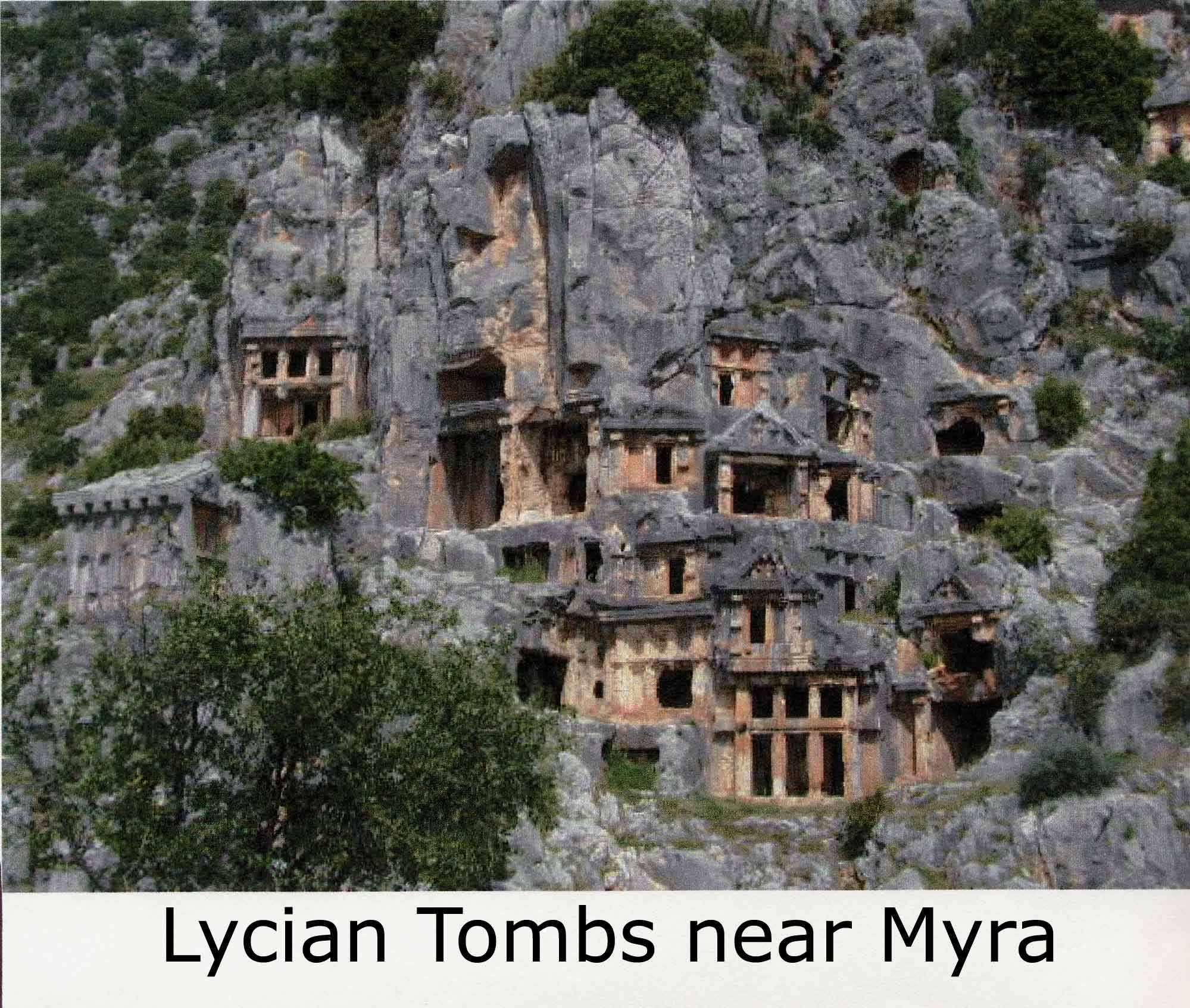 great basilica of
the Christian era, built by Justinian with the claim, "Solomon, I have
outdone you," ringing in our ears, reminding us again of the dangers of too
much collusion with stately endeavors. The achievements, however, of Roman
engineering and construction still cause us to marvel and admire this ancient
civilization---even running water and toilets in the homes and in public places,
sewer systems under the streets, a system to flow water down the main surface of
the street for cleaning purposes, the ingenious cultural and educational uses of
the bath house systems. But then, there were those many gods and their temples
which the great Apostle Paul had to face as he addressed them cleverly by
identifying the "unknown God" of the Greek religious tradition as
Jesus of Nazareth who has now become the one and only God. As ministers of the
Gospel we prayed together in St. Peter's church in Antioch, near the border with
Syria, a cave church that according to the tradition, was used by the early
Christians in that city, and where the name "Christian" was first
applied to followers of "the Way." It was also the alleged site where
Peter and Paul disagreed over the issue of table fellowship between Jews and
Gentiles (cf. Galatians great basilica of
the Christian era, built by Justinian with the claim, "Solomon, I have
outdone you," ringing in our ears, reminding us again of the dangers of too
much collusion with stately endeavors. The achievements, however, of Roman
engineering and construction still cause us to marvel and admire this ancient
civilization---even running water and toilets in the homes and in public places,
sewer systems under the streets, a system to flow water down the main surface of
the street for cleaning purposes, the ingenious cultural and educational uses of
the bath house systems. But then, there were those many gods and their temples
which the great Apostle Paul had to face as he addressed them cleverly by
identifying the "unknown God" of the Greek religious tradition as
Jesus of Nazareth who has now become the one and only God. As ministers of the
Gospel we prayed together in St. Peter's church in Antioch, near the border with
Syria, a cave church that according to the tradition, was used by the early
Christians in that city, and where the name "Christian" was first
applied to followers of "the Way." It was also the alleged site where
Peter and Paul disagreed over the issue of table fellowship between Jews and
Gentiles (cf. Galatians 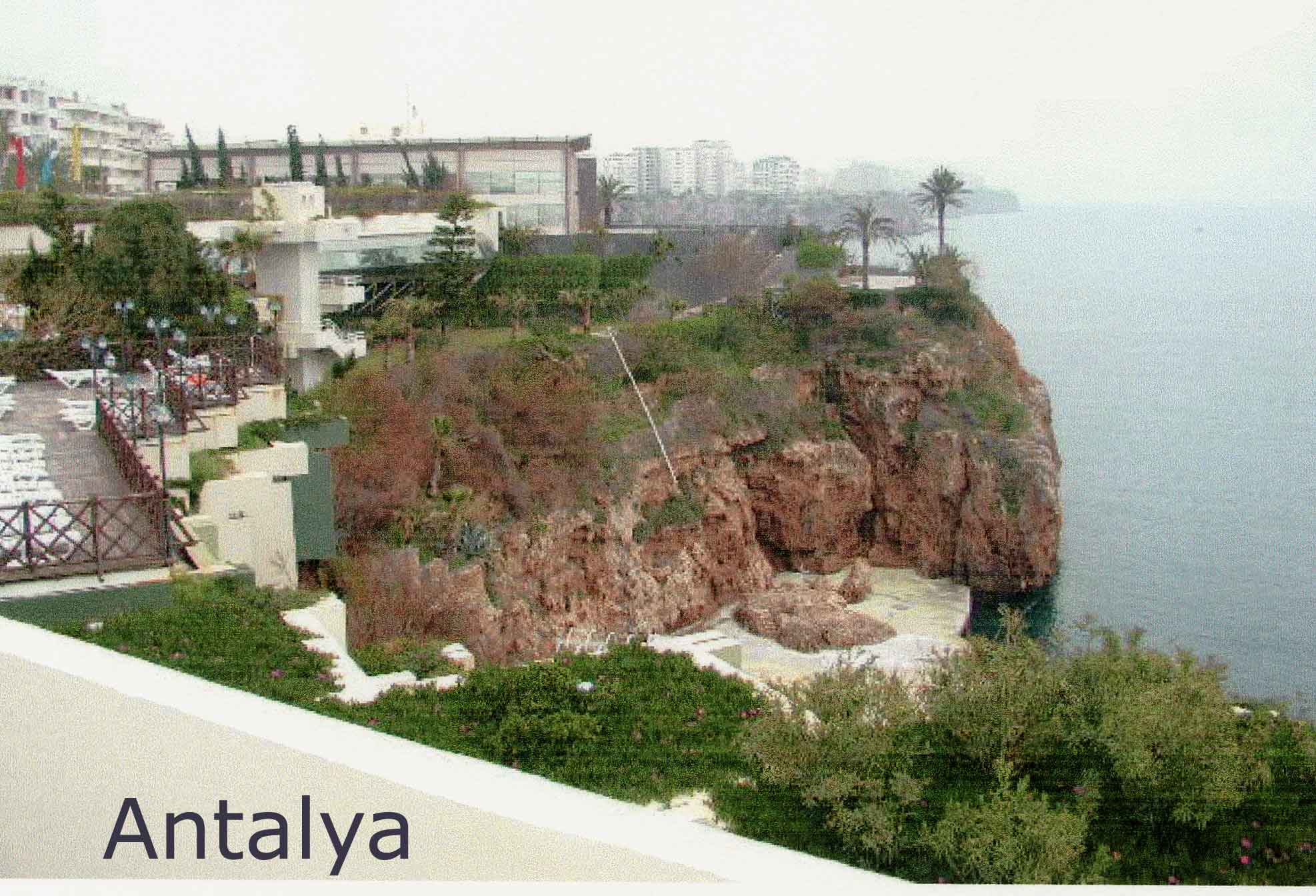 2:11ff), where Barnabas joined Paul for his journey west
to plant churches in the Roman province of Asia, the western part of modern-day
Anatolia. We gathered as a group of representatives from many congregations in
Europe, the Middle East and in Africa to listen to the words of Art Beals, a
Presbyterian Consultant with their Board for World Missions. It was 7:00 a.m. on
a beautiful sunny morning with the rays of light glistening across the sand
swept beach of the Mediterranean near Antalya. The unforgettable moments of
peace and calm, a respite from the hectic pace of our lives back home, brought
new refreshment to us as we listened to the words of our Lord telling Peter and
the other disciples to put their nets on the other side of the boat for a great
catch of fish. What inspiration those words are for those of us who seek to
proclaim the Gospel. Jesus stands with us in our attempts to fish for people. If
one program or event does not work, then let us move on and try something else.
"Courageous Faith"......that was the theme of our time together. Take
heart, keep casting out the nets. God's spirit is with you. 2:11ff), where Barnabas joined Paul for his journey west
to plant churches in the Roman province of Asia, the western part of modern-day
Anatolia. We gathered as a group of representatives from many congregations in
Europe, the Middle East and in Africa to listen to the words of Art Beals, a
Presbyterian Consultant with their Board for World Missions. It was 7:00 a.m. on
a beautiful sunny morning with the rays of light glistening across the sand
swept beach of the Mediterranean near Antalya. The unforgettable moments of
peace and calm, a respite from the hectic pace of our lives back home, brought
new refreshment to us as we listened to the words of our Lord telling Peter and
the other disciples to put their nets on the other side of the boat for a great
catch of fish. What inspiration those words are for those of us who seek to
proclaim the Gospel. Jesus stands with us in our attempts to fish for people. If
one program or event does not work, then let us move on and try something else.
"Courageous Faith"......that was the theme of our time together. Take
heart, keep casting out the nets. God's spirit is with you.
After the Conference, some of us stayed on for an additional three-day tour of
Cappadocia, the high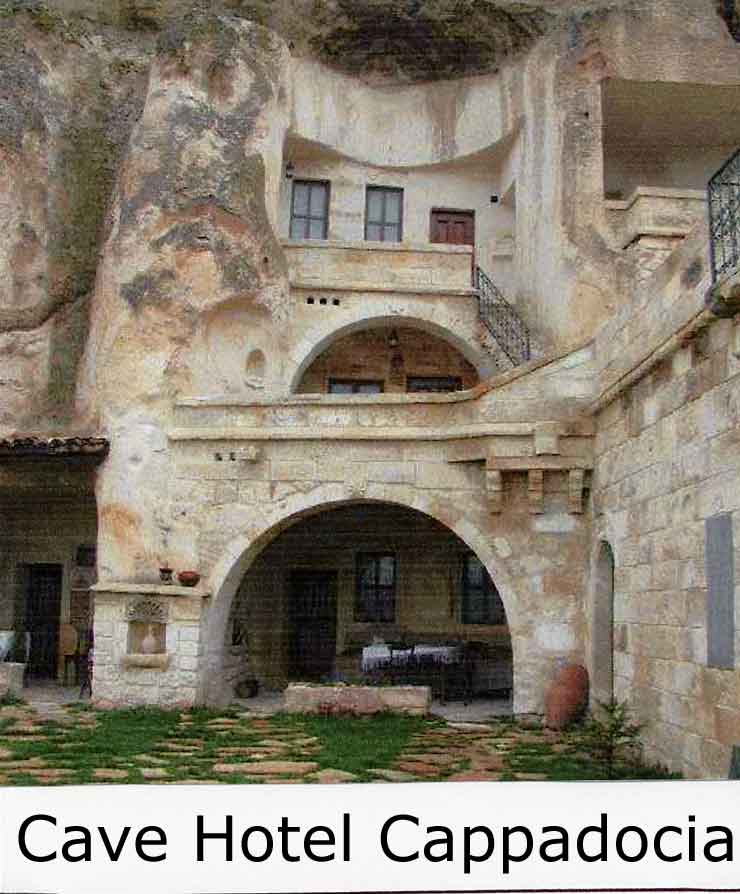 plateau in central Anatolia that was such an important
center of Christianity in the fourth century. There, at Caesarea (modern-day
Kayseri), Bishop Basil, his younger brother Gregory of Nyssa, their sister
Macrina, and their mutual friend Gregory of Nazianzus articulated the doctrine
of the Trinity that was ratified by the Council of Nicea in A.D. 325 and gave us
our Nicene Creed. In this area of Anatolia the landscape is something like that
from outer space. One of our group members commented that "Star Wars"
could have been filmed here. There are deep gorges cut into the flat plateaus
and in the gorges 100's of caves have been hollowed out of the "tufa"
or soft volcanic rock. Underground cities and cave churches populate the entire
area. Estimates are that 30,000 people could live underground for six months,
thus fending off the invading Arabs, Mongols or marauding tribes. Many of these
underground churches have well-preserved frescoes dating back to the 12th- 13th
centuries. Thanks to the Christian and Muslim iconoclasts of the seventh
century, (those who do not believe in painting or sculpting any image of human
beings as aids in worship), many of the frescoes have the eyes or faces
obliterated, but otherwise retain their brilliant colors. plateau in central Anatolia that was such an important
center of Christianity in the fourth century. There, at Caesarea (modern-day
Kayseri), Bishop Basil, his younger brother Gregory of Nyssa, their sister
Macrina, and their mutual friend Gregory of Nazianzus articulated the doctrine
of the Trinity that was ratified by the Council of Nicea in A.D. 325 and gave us
our Nicene Creed. In this area of Anatolia the landscape is something like that
from outer space. One of our group members commented that "Star Wars"
could have been filmed here. There are deep gorges cut into the flat plateaus
and in the gorges 100's of caves have been hollowed out of the "tufa"
or soft volcanic rock. Underground cities and cave churches populate the entire
area. Estimates are that 30,000 people could live underground for six months,
thus fending off the invading Arabs, Mongols or marauding tribes. Many of these
underground churches have well-preserved frescoes dating back to the 12th- 13th
centuries. Thanks to the Christian and Muslim iconoclasts of the seventh
century, (those who do not believe in painting or sculpting any image of human
beings as aids in worship), many of the frescoes have the eyes or faces
obliterated, but otherwise retain their brilliant colors.
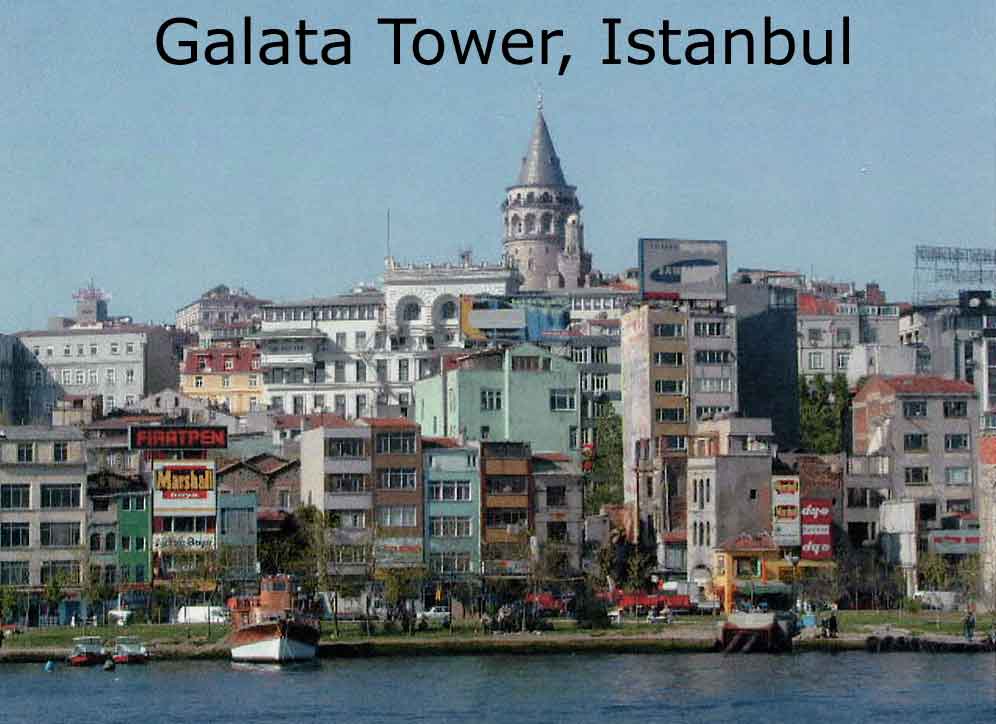 Everywhere you go in modern Turkey today, the presence of the founder of the
Republic, Attaturk, is immortalized in sculpture and stone. As a secular state,
Turkish citizens are proud of their place between east and west. Most people we
encountered were gregarious and friendly, naturally wanting our business, but
also eager for contact with the west. Sadly, following the mass population
exchanges between Greece and Turkey after the Lausanne Treaty of 1924, very few
Christians are left in Cappadocia or any other part of Turkey. No more than 2%
of the population counts itself as Christian, most whom are Syrian Orthodox
believers.
Everywhere you go in modern Turkey today, the presence of the founder of the
Republic, Attaturk, is immortalized in sculpture and stone. As a secular state,
Turkish citizens are proud of their place between east and west. Most people we
encountered were gregarious and friendly, naturally wanting our business, but
also eager for contact with the west. Sadly, following the mass population
exchanges between Greece and Turkey after the Lausanne Treaty of 1924, very few
Christians are left in Cappadocia or any other part of Turkey. No more than 2%
of the population counts itself as Christian, most whom are Syrian Orthodox
believers.
Modern Turkey has a right to bill itself as "the other Holy Land".
When you consider that much of early Christianity, including the writing of the
majority of the books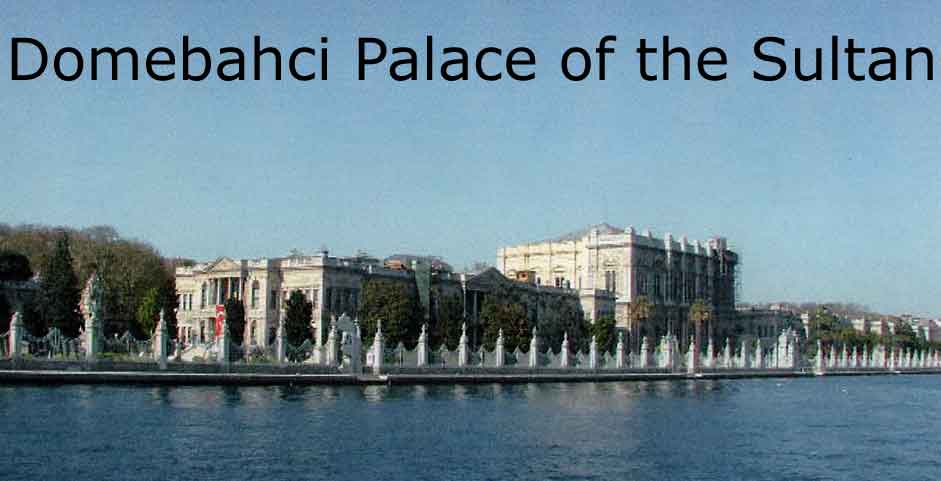 of our New Testament happened there, there is ample reason
for us to consider Turkey as a place for experiential Christian learning and
pilgrimage. The St. Paul Cultural Center in Antalya, our hosts for the
conference, opened their doors and showered their hospitality upon us. We joined
the international congregation of Antlaya, led by James and Renate Bultema for
Sunday worship and dinner and heard about the many programs of a cultural nature
which help to build bridges to Turkish people. In a land where only about 60% of
the people actually practice their Muslim faith, there is plenty of room for the
nets to be cast. May God's people find ways to continue to proclaim the Gospel
in this new and modern secular state. of our New Testament happened there, there is ample reason
for us to consider Turkey as a place for experiential Christian learning and
pilgrimage. The St. Paul Cultural Center in Antalya, our hosts for the
conference, opened their doors and showered their hospitality upon us. We joined
the international congregation of Antlaya, led by James and Renate Bultema for
Sunday worship and dinner and heard about the many programs of a cultural nature
which help to build bridges to Turkish people. In a land where only about 60% of
the people actually practice their Muslim faith, there is plenty of room for the
nets to be cast. May God's people find ways to continue to proclaim the Gospel
in this new and modern secular state.
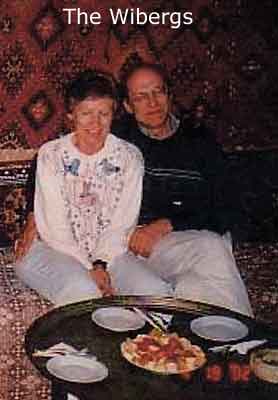 Luray and I have been touched by the warmth and friendliness of the people of
Turkey. It is also one of the more beautiful countries we have visited. This is
only a brief taste of our experience and I would be delighted to share more with
those of you who are interested (including our group experience in a Turkish
bath, if you talk to us privately). I need much more time to reflect on our
experience and to put the names on my pictures, but I want to express our
gratitude to the congregation for supporting us in this annual journey. The
opportunity to be with other pastoral staff from many different international
congregations is an important part of our supportive systems. Since most of us
do not have clergy peer fellowship like we did in our homelands, these annual
conferences are important times of spiritual renewal, fellowship with
colleagues, and new learning experiences.
Luray and I have been touched by the warmth and friendliness of the people of
Turkey. It is also one of the more beautiful countries we have visited. This is
only a brief taste of our experience and I would be delighted to share more with
those of you who are interested (including our group experience in a Turkish
bath, if you talk to us privately). I need much more time to reflect on our
experience and to put the names on my pictures, but I want to express our
gratitude to the congregation for supporting us in this annual journey. The
opportunity to be with other pastoral staff from many different international
congregations is an important part of our supportive systems. Since most of us
do not have clergy peer fellowship like we did in our homelands, these annual
conferences are important times of spiritual renewal, fellowship with
colleagues, and new learning experiences.
Turkey - May 2001
Louise Carlson
Our short visit to Turkey began with a rainy day in Istanbul. That was not too hard to cope with since most of
the sights we visited there were indoors: The Blue Mosque, St.
Sophia's and the Topkapi Palace. We were inundated with vendors 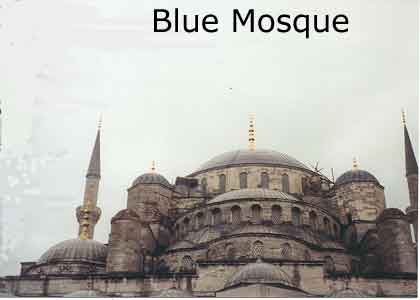 selling
books, post cards and umbrellas, so shopping was not a problem. The
rains let up while we had our Turkish lunch in an open-air restaurant. It
had a roof, so it would not have been a problem anyway, except for a strong
wind. This was another of our very interesting eating adventures while on
the trip. It's not Midwest cuisine, that's for sure! [Ed.
note: see Greece for insert]. selling
books, post cards and umbrellas, so shopping was not a problem. The
rains let up while we had our Turkish lunch in an open-air restaurant. It
had a roof, so it would not have been a problem anyway, except for a strong
wind. This was another of our very interesting eating adventures while on
the trip. It's not Midwest cuisine, that's for sure! [Ed.
note: see Greece for insert].
After our day in Athens we sailed for Kusadasi, which is the
port from which tours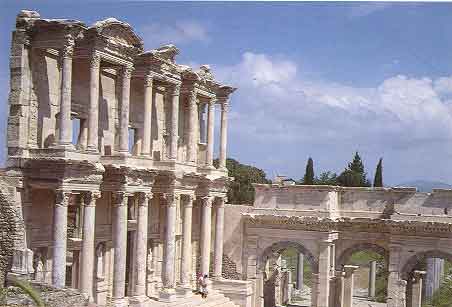 to Ephesus leave. What an interesting stop that was!
To think that this was a huge thriving city when Paul was on his missionary
journeys is amazing. And the parts of the buildings that they have been
able to reconstruct from the jumbled piles of rubble are incredible. Also
amazing were the notes about sewage systems and aqueducts in place at that time.
You have to see it to believe it. The city is spread out over many, many
acres. Every turn takes you to another fantastic view. [Ed
note: See Greece for remainder of trip] to Ephesus leave. What an interesting stop that was!
To think that this was a huge thriving city when Paul was on his missionary
journeys is amazing. And the parts of the buildings that they have been
able to reconstruct from the jumbled piles of rubble are incredible. Also
amazing were the notes about sewage systems and aqueducts in place at that time.
You have to see it to believe it. The city is spread out over many, many
acres. Every turn takes you to another fantastic view. [Ed
note: See Greece for remainder of trip]
Turkey - July 1989
Vicky Blitz
Istanbul, it seemed to me, was the most oppressive place I have ever been. Perhaps, it was because it was a very hot day and we saw so many local women in those awful black robes and veils. Perhaps, it was because we had come from one of my favorite of all places on earth,
awesome, enchanting, Greece. Perhaps, it was because, it seemed to me, to be a dirty place. Perhaps, I was just
hot and tired and my knee was bothering me.
 Our cruise ship entered the Dardanelle's, where the British had once been involved in a great Naval
battle. Because my father (U.S. Navy for 31 years) had mentioned it so often, I set my alarm clock for five in the morning so that I wouldn't miss anything. But, guess what, folks! There isn't any thing to see. What ever was I thinking? It's just an enormously wide
expanse of ocean, large enough for a great Naval battle. That's all!
Our cruise ship entered the Dardanelle's, where the British had once been involved in a great Naval
battle. Because my father (U.S. Navy for 31 years) had mentioned it so often, I set my alarm clock for five in the morning so that I wouldn't miss anything. But, guess what, folks! There isn't any thing to see. What ever was I thinking? It's just an enormously wide
expanse of ocean, large enough for a great Naval battle. That's all!
After lunch, our ship went through the Sea of Marmora, which I ignored completely. In the late afternoon, I was up on deck, however, for
Istanbul and took too many pictures of the skyline as we passed by and went up through the Bosphorus Straights. We went far enough to see the Black Sea in the distance, but then turned around, went back, and finally docked at
Istanbul.
I had signed up for the "night out" ($40.00) and we were loaded onto busses and taken to an enormous
hall, where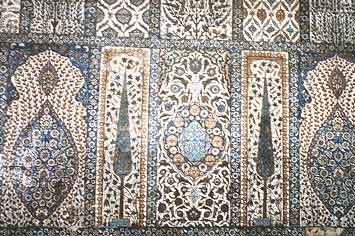 we were seated at tables for dinner and a floor show. I do not
exaggerate when I say, there seemed to be about 2,000 people crammed into the area. I was grateful that our table was close to the exit, so that, had there been a fire, I planned to be the first out the door. We had a very good Turkish dinner and the floor show included three
belly dancers, two troops of folk dancers, one magician and THEN, the hit of the evening. we were seated at tables for dinner and a floor show. I do not
exaggerate when I say, there seemed to be about 2,000 people crammed into the area. I was grateful that our table was close to the exit, so that, had there been a fire, I planned to be the first out the door. We had a very good Turkish dinner and the floor show included three
belly dancers, two troops of folk dancers, one magician and THEN, the hit of the evening.
A very charismatic Turkish couple took the stage. They were very good singers but their forte was the ability to ENTERTAIN and they were VERY funny. First, they established which countries were represented in the audience. Then they sang a song from each country, with audience participation. The crowd was mostly tour groups. However, there were one or two or three people, only, from Japan, South Korea, Mexico and Greece, so they had to go on stage while their songs were being sung, and they brought down the house. It is truly
amazing to me how, with so many different countries, this Turkish couple could find common
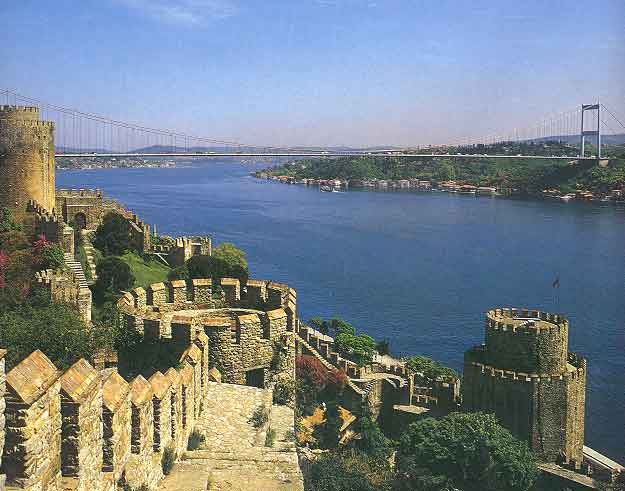 ground for laughter. May I reiterate; I always go to these optional side trips. They are always well worth the price. ground for laughter. May I reiterate; I always go to these optional side trips. They are always well worth the price.
We boarded the bus again and our guide had the driver take us over the bridge to the Asian side of the City. We
were each given a certificate indicating that we had been on both the European and the Asian
continents while in the city of Istanbul.
We covered a lot of territory the next day and saw many interesting things, including the priceless treasures and jewels at the Topkapi Palace. But I was most fascinated by the incredibly beautiful mosques, covered with millions of tiny little
mosaic tiles. The Souleymanie Mosque is the largest in the city and was built in only seven years. Islamics do not believe in drinking and the artist, who made their stained glass windows, couldn't work without his bottle, so they gave him special permission to carry it with him as he worked.

Hagia Sophia is also an astounding piece of art. But my favorite was Sultan Ahmet's Blue Mosque. It is the only one in the world that has six minarets. Actually, there HAD been another mosque with six minarets, but
Ahmet bought them off and paid them to tear down one of their minarets so the Blue Mosque could have that distinction.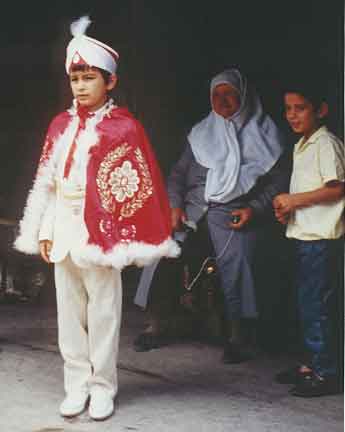
 There were two interesting moments, both occurring outside a mosque. The first was when we saw a man walking a
bear down the street, on a leash, on his hind legs (the bear, of course). For the other, refer to the picture of the little boy in the cape and crown.
Babies are not circumcised in this country until they are older. And it is quite the
ceremony, and they make a big deal out of it. He gets to wear a cape and a crown all day, and go to the mosque
and have his picture taken. We just happened to luck into being there at the right moment. You will see his mother and younger brother in the background of the picture.
There were two interesting moments, both occurring outside a mosque. The first was when we saw a man walking a
bear down the street, on a leash, on his hind legs (the bear, of course). For the other, refer to the picture of the little boy in the cape and crown.
Babies are not circumcised in this country until they are older. And it is quite the
ceremony, and they make a big deal out of it. He gets to wear a cape and a crown all day, and go to the mosque
and have his picture taken. We just happened to luck into being there at the right moment. You will see his mother and younger brother in the background of the picture.
The highlight of Turkey was, most certainly, the ancient Roman city of Ephesus, which is now being reconstructed by teams of archeologists from
several countries. Our ship docked in the port of Kusadasi and we took a half hour bus trip to our destination. What an interesting place! We strolled down, through that
marble city with our tour guide, for one of the most exciting historical commentaries, I have ever heard. We were told that Ephesus was the largest excavation in the the world.
The city was begun in the third century B.C., to serve as sea port. John, the disciple, was preaching there in the nineties A.D. and started his church. By the fifth century A.D. the river was silting over and, as the docks
be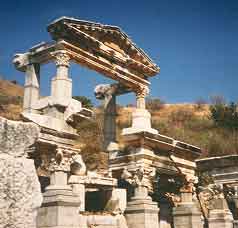 came farther and farther from the city street, it became an
undesirable port. Today, the river is five miles from the city. Add to their port problems, malaria was beginning to be of concern. If that wasn't enough, they began experiencing earth quakes that destroyed their temples and they began to believe Christianity was right and God must be trying to tell them something. So, according to our guide, they simply walked away from this now ruined city, which had once been so beautiful, leaving behind their money and jewels to show their sincerity to God. Pardon me if I'm a bit
skeptical. came farther and farther from the city street, it became an
undesirable port. Today, the river is five miles from the city. Add to their port problems, malaria was beginning to be of concern. If that wasn't enough, they began experiencing earth quakes that destroyed their temples and they began to believe Christianity was right and God must be trying to tell them something. So, according to our guide, they simply walked away from this now ruined city, which had once been so beautiful, leaving behind their money and jewels to show their sincerity to God. Pardon me if I'm a bit
skeptical.
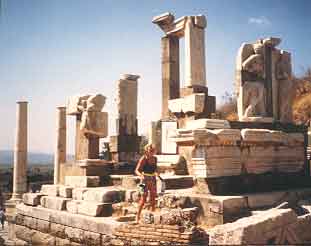
However, today you can see the Roman Bath, the Agora (public meeting place), the hospital, the two stories high Fountain of Trageon, Hadrian's Temple (second century), the
amphitheatre (still being used for concerts), the mosaic tiled floors of residences, Celcus Library across the street from the brothel, etc. Interesting to note, the brothel was larger then the library, even though the library was the third largest paper library in the world at that time, and there was an under ground tunnel connecting the two. The library was built facing the east to catch the morning light, so they could read their paper scrolls, without having to burn torches and get soot all over the walls and ceilings.
As you can see from the picture (right), we were there in the afternoon, and
therefore the sun has moved around to the back of the library. that time, and there was an under ground tunnel connecting the two. The library was built facing the east to catch the morning light, so they could read their paper scrolls, without having to burn torches and get soot all over the walls and ceilings.
As you can see from the picture (right), we were there in the afternoon, and
therefore the sun has moved around to the back of the library.
To our amusement, we learned the custom surrounding the public potty. We viewed a three hole marble toilet, where gentlemen could sit and talk, which faced a gold fish pond, behind which was a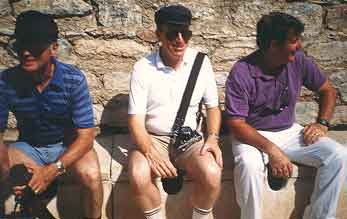 small stage for the musicians. We were told that, on cold mornings, it was the custom to send one's servants ahead, to sit on the three holer to warm it up. I found this all very difficult to believe, but the evidence was right there in front of
us, and three of our guys even tried it out, as you can see.
small stage for the musicians. We were told that, on cold mornings, it was the custom to send one's servants ahead, to sit on the three holer to warm it up. I found this all very difficult to believe, but the evidence was right there in front of
us, and three of our guys even tried it out, as you can see.
Yes, if you are ever in the neighborhood, the ancient city of Ephesus in most
certainly a "must see".
THINK GLOBALLY - ACT LOCALLY - PRAY FOR WORLD PEACE
|
